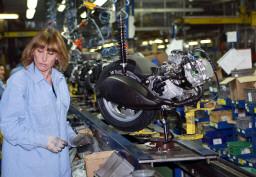A report from the Organization for Economic Cooperation and Development (OECD) showing Italy trailing for salaries earned by single-person households was the focus of contention Monday between Italy's center-right government, the center-left opposition, unions and employers.
The weekend report placed Italy in 23rd place out of OECD's 30 members for the annual net salary for a single-person household based on purchasing power.
At $21,374, Italy found itself behind countries like Greece and 17% below the OECD average of $25,739.
According to the report, based on data for 2008, salaries for single-person households in Italy are 44% less than in Britain, 28% less than in Germany and 18% less than in France.
Compared to most of its OECD partners, Italian salaries were penalised by the high tax pressure which absorbed 46.5% percent of earnings, the sixth-highest in the OECD.
''Perhaps (Welfare Minister Maurizio) Sacconi is right to say that that this (report) is nothing new and that the gap between labor costs and salaries is not the government's fault. But the fact that tax pressure has increased is the government's fault and no one else's,'' observed the opposition Democratic Party (PD) deputy House whip Marina Sereni.
''For a government which made 'less taxes for everyone' one of its electoral slogans, the fact that Italians are paying higher taxes, especially salaried workers, is quite an achievement,'' she added.
The PD's shadow economy minister, Pierluigi Bersani, called for lower taxes on salary income and urged the government to admit a crisis existed and open a serious debate.
''For people who have trouble making it through the month, the (government's) almost daily call to be optimistic is like a slap in the face. You can't keep saying that the sun is shining when everyone can see it's raining,'' Bersani said.
Daniele Capezzone, spokesman for the governing People of Freedom (PdL) party replied that ''there is something surreal about the PD's reaction to the OECD report. They fail to remember that when they were in government they did not take advantage of a positive economic cycle and used it instead to hike taxes on all salaries, even the lowest''.
According to the minister for government program, Gianfranco Rotondi, ''the opposition is riding the wrong horse. The OECD report needs to be taken into consideration, but the opposition has deliberately forgotten the economic measures this government has adopted and the efforts it is making in the framework of an international crisis, obtaining excellent results''.
Italy's civil service minister, economist Renato Brunetta said in a press interview Monday that in order to increase salaries, incentives were needed to boost productivity.
Welfare Minister Sacconi, on the other hand, said in another interview that salaries had to be linked closer to a company's performance.
Guglielmo Epifani, the head of Italy's biggest trade union, CGIL, argued that ''there is no plausible explanation for this government's civil, democratic and political insensitivity '' as demonstrated by its ''refusal to sit down with unions and address the crisis''.
Looking at the OECD report, the CGIL chief observed that ''purchasing power is declining because income tax is eating up what it achieved through greater productivity''.
According to the deputy chairman of the national employers' association Confindustria, Alberto Bombassei, ''a distinction needs to be made between salaries and labor costs. Taxes on labor are very high. For every 100 euros in salaries, employers must pay 160 euros in taxes and social security contributions while the employee get only 70 euros in his pocket''.
Italy's biggest problem, he said, was productivity.''We rank very low for productivity and since this is what creates wealth, before raising salaries we need to generate greater wealth, boost the country's GDP''.









